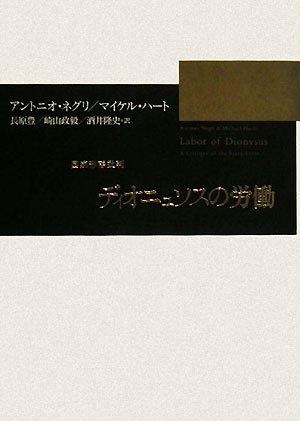- 著者
- 長原 豊
- 出版者
- 経済理論学会
- 雑誌
- 季刊経済理論 (ISSN:18825184)
- 巻号頁・発行日
- vol.43, no.4, pp.27-40, 2007
Facing the historically specific socio-political situation of Japan since the 68 and the 89/91 under which nigh no marxian economist ventures to attempt to decipher the capitalist expropriation and exploitation as the historically specific continuous events, I, not only having in mind Toni Negri and Felix Guattari's desire such as "[n]ow everything must be reinvented," but also being inspired by a marxian Geist like "the Bliz of reason, the Jetzt of the moment of rupture" (Negri), would map out the European as well as the North American pole-mos around them. Paraphrazing from the political viewpoint, I perforce aim at intervening into the Japanese marxian circus so as not to shrink from theoretically setting up the praxis-laden arena where the Japanese autistic marxian academia cannot but at once re-member and re-cuperate the very point-the 1920s-from where they got their efforts started. The two diametrical poles are axiomatically established as the symbolic exemplars: the so-called Analytical Marxism (or Rational Choice Marxism) on one hand; the Operaismo type of marxian standpoint on the other. This setting is chosen not simply in terms of the theoretical standpoint per se but with a perspective for the praxis in the street to come. I describes the former as the camp which eventually arrests the theory of exploitation in that of PC type justice by introducing at the outset the very axiom of the methodological individualism which presupposes that the exploitation takes place in the rationally "equal" exchanges among the homogeneous "producers" fabricated following its own axiom, which, in its turn, eventually corners itself to discover as the cause of exploitation the so-called initial inequality of the assets even breaking the initial axiomatic circle of its own. In a stark contrast to the former, the latter, following Marx, grasps the expropriation-cum-exploitation as the processes of the formal/substantial subsumption of labour-power by capital. These two historically continuous as well as structurally juxtaposed processes can be lumped together under the Deleuzo-Guattarian notion of "appareil de capture". In other words, the latter posits it as that which takes place not simply in the capitalist processes as such but also in the socalled originary accumulation of capital incessantly functioning behind it since its advent, which eventually culminates in the total subsumption of the Socius up until to the point at which the reproduction of life itself is totally subsumed and commanded by capital (the advent of the bio-politique as the socio-political system of expropriation/exploitation). After having so mapped them out and then translated them as the very political contrast between the camp which insists on the very existence of the inequality of the initial endowments and the belated corrective of it by the State on the one hand and the camp which underscores the total subversion of "the state of affair" (Marx) where the living labour is being expropriated-qua-exploited by the dead labour (capital) on the other, I, by highlighting the specific parlance such as the "Arbeit der Oberleitung " and the "Strasse" in Das Kapital III-"Die kapitalistische Produktion selbst hat es dahin gebracht, dass die Arbeit der Oberleitung, ganz getrennt vom kapitaleigentum, auf der Strasse hermlauft"-, explicitly allude a viability of the strategy of "having-sabots-on" or of "le refus du travail" in the "Strasse" almost totally organized as the social factory: in order to re-capture back our living labour as the "form-giving fire" (Grundrisse) from the dead labour and substantially re-subsume it as our own "living time."
1 0 0 0 永遠の経済的非常事態 (特集 債務危機 : 破産する国家)
- 著者
- ジジェク スラヴォイ 長原 豊
- 出版者
- 青土社
- 雑誌
- 現代思想
- 巻号頁・発行日
- vol.40, no.2, pp.86-95, 2012-02
1 0 0 0 ディオニュソスの労働 : 国家形態批判
- 著者
- アントニオ・ネグリ マイケル・ハート著 長原豊 崎山政毅 酒井隆史訳
- 出版者
- 人文書院
- 巻号頁・発行日
- 2008
- 著者
- Rubin Gayle 長原 豊
- 出版者
- 青土社
- 雑誌
- 現代思想
- 巻号頁・発行日
- vol.28, no.2, pp.118-159, 2000-02
